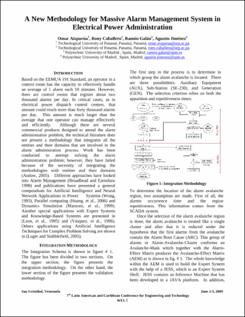Mostrar el registro sencillo del ítem
A New Methodology for Massive Alarm Management System in Electrical Power Administration
| dc.contributor.author | Aizpurúa, Omar | |
| dc.contributor.author | Caballero, Rony | |
| dc.contributor.author | Galán, Ramón | |
| dc.contributor.author | Jiménez, Agustín | |
| dc.date.accessioned | 2017-08-01T20:51:50Z | |
| dc.date.accessioned | 2017-08-01T20:51:50Z | |
| dc.date.available | 2017-08-01T20:51:50Z | |
| dc.date.available | 2017-08-01T20:51:50Z | |
| dc.date.issued | 2009-07-01 | |
| dc.date.issued | 2009-07-01 | |
| dc.identifier.uri | http://ridda2.utp.ac.pa/handle/123456789/2412 | |
| dc.identifier.uri | http://ridda2.utp.ac.pa/handle/123456789/2412 | |
| dc.description | The paper presents a methodology that integrates several available techniques to manage the massive amount of alarm signals in electrical power dispatch control centers, as well as the contribution of each entity involved in the systems. Artificial intelligence techniques that can be used to solve this problem are reviewed here. The final objective is to find the root cause of avalanches of alarms (failure trees) and to reduce their number through grouping or clustering techniques, complying with the EEMUA 191 standards. Even though other contributions in this topic have been made before, the alarm management problem continues to be practically unsolved for many applications in industry. Here, the integration is developed using the ontology of the alarms. Additionally, in this methodology, a rule based expert systems is used to find the "Alarm Root Cause" and Clustering Technique (data segmentation) approach to treat the historical database of alarms. | en_US |
| dc.description.abstract | The paper presents a methodology that integrates several available techniques to manage the massive amount of alarm signals in electrical power dispatch control centers, as well as the contribution of each entity involved in the systems. Artificial intelligence techniques that can be used to solve this problem are reviewed here. The final objective is to find the root cause of avalanches of alarms (failure trees) and to reduce their number through grouping or clustering techniques, complying with the EEMUA 191 standards. Even though other contributions in this topic have been made before, the alarm management problem continues to be practically unsolved for many applications in industry. Here, the integration is developed using the ontology of the alarms. Additionally, in this methodology, a rule based expert systems is used to find the "Alarm Root Cause" and Clustering Technique (data segmentation) approach to treat the historical database of alarms. | en_US |
| dc.language | eng | |
| dc.language.iso | eng | en_US |
| dc.rights | https://creativecommons.org/licenses/by-nc-sa/4.0/ | |
| dc.rights | info:eu-repo/semantics/openAccess | |
| dc.subject | massive alarm | en_US |
| dc.subject | power administration | en_US |
| dc.subject | massive alarm | |
| dc.subject | power administration | |
| dc.title | A New Methodology for Massive Alarm Management System in Electrical Power Administration | en_US |
| dc.type | info:eu-repo/semantics/article | |
| dc.type | info:eu-repo/semantics/publishedVersion |
